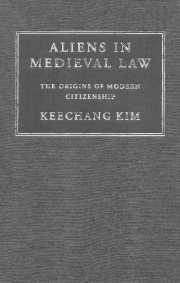8 - Calvin's case (1608)
Published online by Cambridge University Press: 08 July 2009
Summary
Queen Elizabeth I outlived all the heated debates arising from the succession question and died in 1603. The accession of James VI of Scotland to the crown of England marks the beginning of a long and tortuous process through which ‘British’ political and legal discourse has been created and recreated until this date. Regarding the political union of the peoples, the claims of James VI and I found an excellent means of expression in the concept of the ‘mystic body politic’. The following passage from his speech in the English Parliament seems to reveal the basic framework of his thought:
What God hath conioyned then, let no man separate. I am the Husband, and all the whole Isle is my lawfull Wife; I am the Head, and it is my Body; I am the Shepard, and it is my flocke: I hope therefore no man will be so vnreasonable as to thinke that … I being the Head, should haue a divided and monstrous Body.
Lawyers, however, were encountering difficulties in giving legal effect to his enthusiastic claims about Great Britain. In an effort to draw up a scheme of ‘real and effectual’ union of the two kingdoms, Commissioners of Union were appointed in 1604 by the Parliaments of England and Scotland respectively. Also, a number of learned tracts dealing with the question of legal union were written and circulated during this period.
- Type
- Chapter
- Information
- Aliens in Medieval LawThe Origins of Modern Citizenship, pp. 176 - 199Publisher: Cambridge University PressPrint publication year: 2000
- 1
- Cited by



